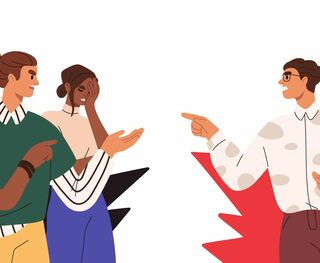Narcissism
How Narcissists Can Drive Polarization
They can divide families, friends, co-workers, and nations, if you let them.
Posted June 17, 2022 Reviewed by Davia Sills
Key points
- In families, narcissists can start tribal warfare over the children, especially in divorce.
- In the workplace, narcissists can divide teams over "winners" and "losers."
- In health care, narcissists can drive "staff splitting," by turning staff against each other.
- In politics, narcissists can make repeated comments about "losers" making it hard to work together and compromise.
Narcissists are well-known for being self-centered and arrogant. But they also can be extremely divisive. The DSM-5-TR lists “fantasies of unlimited success, power,” “interpersonally exploitative,” and “lack of empathy” as some of the possible factors for those with a narcissistic personality disorder.1 These characteristics can lead to what mental health professionals call “splitting.” This occurs when a person sees others as all-bad or all-good, or as very superior or very inferior, or as winners or losers, with no gray areas in between.

The impact of this splitting can be contagious so that others near the narcissist may start seeing the world this way as well, and a whole group may become polarized within itself.
Polarization in families
This can occur especially during and after a separation or divorce. A narcissistic parent may tell the children that the other parent is stupid or a loser or that the divorce is all the other parent’s fault. Over time, children absorb such negative comments and start using them as their own: “Dad says you’re a loser,” or “Mom says that you’ll never amount to much.” Then the children start resisting or refusing contact with the “loser” parent. In such cases, the family often ends up in court with relatives, friends, and professionals taking one side or the other in what some call tribal warfare.
One side may say that the child resists contact with one parent because the “rejected” parent must have been abusive or inappropriate with the child. The others defend the rejected parent, saying that the “favored” parent must have been bad-mouthing the rejected parent in front of the children.
As mediators, evaluators, and judges try to figure this out, the level of anger and frustration increases among all involved. It turns into a great emotional polarization called parental alienation. Yet it is often driven primarily by one parent with all-or-nothing thinking, unmanaged emotions, and an arrogant sense of superiority. This is often a narcissistic parent, although there are other possibilities in some cases. (Parents with borderline personalities may also engage in splitting.) The child usually adopts the all-or-nothing thinking and unmanaged emotions of one parent and becomes more and more extreme in their resistance or refusal to have any contact at all with the other parent. This may even include aunts and uncles and grandparents in the larger family polarization.
Polarization in the workplace
In the workplace, a narcissist may repeatedly disparage or even bully one worker and praise others, which is often called mobbing or group bullying. Sooner or later, the group may become split between those who believe and favor the bully and those who believe and defend the target of the bullying. Usually, this is led by a narcissist, who enjoys disparaging someone who they deem a loser while claiming to be quite superior in comparison.
A narcissist will often actively recruit others to agree with him and take his side. Since this is primarily an emotional process, each side may start to feel intense dislike or resentment toward the other side as the group becomes intensely “split” and increasingly dysfunctional.
Polarization in health care
An example of how polarizing such a person may be is known as “staff splitting” in health care settings, such as hospitals, where there is a team working with each patient, including a doctor, nurses, social workers, and others. A patient may tell one team member that they are very good at their job but that another team member is incompetent or unhelpful. This can lead to team members viewing each other in similarly positive or negative ways and eventually resenting each other as they absorb the winner-loser split of the narcissistic patient. Of course, such teams often work hard not to let such splitting happen, especially if they are aware of the potential impact of a personality-disordered patient on the unit.
Polarization in politics
This has become an increasing concern over the past decade or so, as people in many countries have seen their leaders and political parties become emotionally polarized. It’s important to know that this is an emotional process, more than a rational, normal product of disagreements over policies. For decades, opposing politicians have been able to disagree and yet negotiate compromises on a full range of issues. More recently, with the help of cable news and social media, differences are heightened, and those politicians with more narcissistic tendencies appear to have grabbed the spotlight and chased away the more moderate, flexible politicians.
It has to be understood that in many ways, today’s polarization is not over issues but over personalities—often narcissistic personalities who do not seem to care about the impact of their words and behavior on others. After all, in their drives to gain “unlimited power,” they feel free to be “interpersonally exploitative,” and their “lack of empathy” allows them to behave in such a manner.
While many people believe that social media has made us more aggressive and hostile politically, recent research suggests that it really is a small subset of people driving this polarization. “Instead, hostile political discussions are the result of status-driven individuals who are drawn to politics and are equally hostile both online and offline. Finally, we offer initial evidence that online discussions feel more hostile, in part, because the behavior of such individuals is more visible online than offline.”2
What is to be done?
By recognizing these patterns of behavior, we may be more able to tune out those who would polarize us for their own narcissistic purposes. Speaking respectfully one-to-one seems to be much more effective as a way to overcome polarization rather than listening to and believing what aggressive personalities are telling us about others, our so-called enemies. So often, the “issue” is not the issue; the personality is the issue.
References
American Psychiatric Association: Diagnostic and Statistical Manual of Mental Disorders, Fifth Edition, Text Revision. Washington, DC, American Psychiatric Association, 2022, 760.
Alexander Bor and Michael Bang Petersen, "Abstract: The Psychology of Online Political Hostility: A Comprehensive, Cross-National Test of the Mismatch Hypothesis," American Political Science Review. Published online by Cambridge University Press: 26 August 2021.




